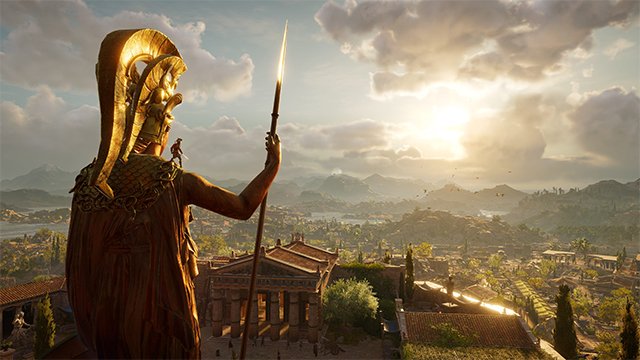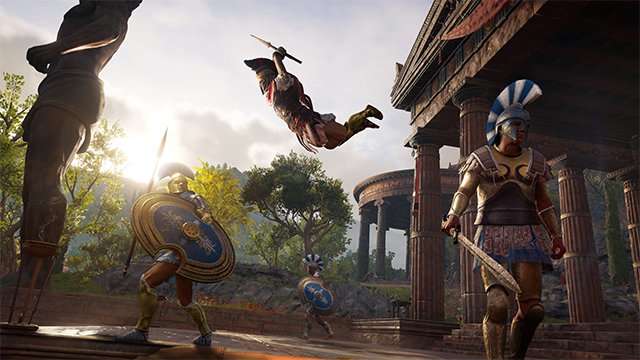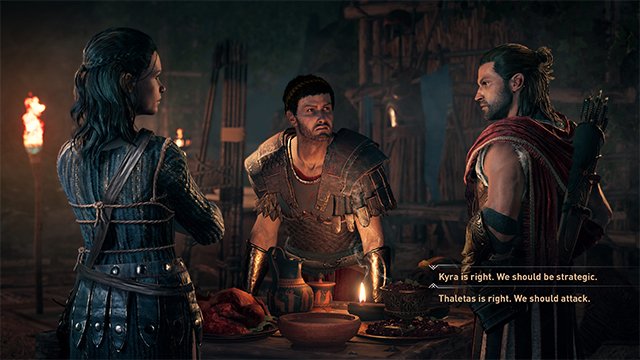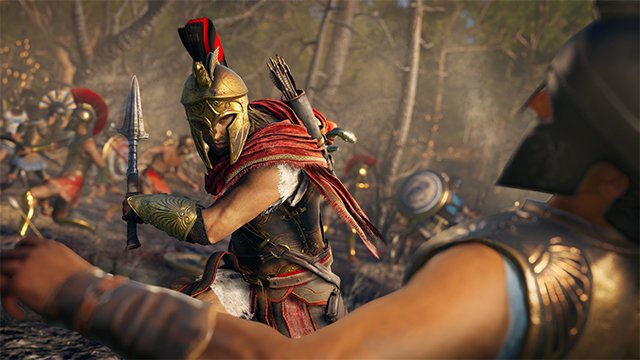Assassin’s Creed Origins dipped its toe into a bigger, Witcher-like style of RPG. But despite its changes, it still had enough of the series’ DNA as it showed us the titular origins of the Brotherhood. Assassin’s Creed Odyssey seems to have fully cannonballed into the RPG pool and, at first glance, it looks to have little in common with Altaïr’s initial quest in 2007. And while it is a bit striking to see the series like this, it is still seems like an Assassin’s Creed game, but in other less apparent ways.
The most immediate non-Assassin’s Creed thing about Odyssey is the lack of the iconic hood. Alexios, the male protagonist I chose to play as, is covered in period-appropriate gear from his sandal-tipped toes to his brushy Spartan helmet. It’s a stark contrast to what we’ve associated with the Creed. That’s not necessarily a bad thing but it is a good visual indicator that the game you’re about to play might be something you’re not expecting.
Assassin’s Creed Odyssey Preview: This Is Sparta

Alexios doesn’t fight like a typical assassin either. While Origins reinvented the typical counter-based combat, Odyssey has gone down a more offensive path. Taking a page from the studio’s last game, Assassin’s Creed Syndicate, Alexios (or Kassandra) moves at a quicker pace, skewing the balance towards fast action over defensive dueling.
Swordplay is so offensively based that you can’t even block; you can only parry. Eight slottable melee abilities also keep you on the attack and use your adrenaline gauge for special attacks like a devastating Sparta kick and just repeatedly stabbing someone over and over. Origins’ swordplay has a place and works well but the forward momentum of Odyssey’s combat felt responsive and was a welcome change from what we’ve seen in the past.
Assassin’s Creed Odyssey Preview: Odyssey Mythology

This quicker style of play worked better against the boss fight I came across. I don’t want to spoil it, even though I think it’ll be in some future trailer, but it wasn’t something of this realm. It was fast, tricky, and not only tested the combat’s newfound agility, but also what I thought I’d see in an Assassin’s Creed game that wouldn’t just be shaken off as a dream. It’s not uncommon for an Ubisoft game to make the player hallucinate some supernatural instances. Creative Director Jonathan Dumont explained his philosophy regarding this issue to me.
“We wanted to make them not a scenario where you need to drink the thing to see,” he said. “We wanted to make sure you could be surprised in the game by finding these things. We want to keep you guessing a little bit more. When you’re going deep in the forest where people did believe that these things existed, we try to embrace that a little bit more.”
The mythological angle gives the series the opportunity to touch on something it rarely has: the First Civilization. Outside of the weird glyphs from Ezio’s trilogy, this mysterious group of people has rarely been seen or talked about in a coherent way. While Dumont intelligently didn’t spill all of the beans, he hinted at how the First Civilization factors into these myths as well as the storytelling at large.
“We always go into history and try to learn about it and try to recreate a plausible, in this case, Ancient Greece,” explained Dumont. “And then we conflict between order and chaos that are typically Templars and Assassins. Now being before, the third pillar of that is the First Civilization. So we wanted to focus a little bit more on that still with having a theme of order and chaos but embracing that. Going back before, it allowed us to do that in a little bit more of a freer way.”
Assassin’s Creed Odyssey Preview: ACRPG

The First Civilization seemed to be linked with the supernatural portions and integrated into the main story, even though I didn’t get to see much of that during my two hours relegated to side content. Dumont talked about how the freedom of (ironically) chronologically going before Origins let them slightly reprioritize what underutilized Assassin’s Creed principles they wanted to focus on while also staying true to the series as a whole.
“It’s just that were using more of a different pillar of our franchise,” he explained confidently. “So we’re using the ties to the First Civilization, the mysteries of these things like that. We’re also a historically-based game so wherever you’re gonna go in the game, you’re going to learn about history like we’ve always had so it is a pillar of our game. Mechanically, you can recognize the franchise with stealth, combat, and ranged. And then Templars versus Assassins is a combat of free will and order. We still have that in our game but with different faces.”
Their order in the timeline lets them shake established notions and afford the players choices they may not have typically had while in the Brotherhood. This plays into the whole RPG-ness of the game. Dialogue options let you make your own version of the protagonist. The multiple collectible resources look to be a bigger part in how you upgrade your gear. Stealth kills and arrows rarely seemed to do much damage, which show the game’s reliance on stats over realism like most RPGs. Most enemies can even be non-lethally taken out and recruited. There are a ton of systems at play and speak to how seriously Odyssey is taking its role-playing elements and how minuscule two hours feels within the grand scope of the game.
Those few hours did initially give the impression that Assassin’s Creed Odyssey isn’t really an Assassin’s Creed game. But most of those parts were there, just shuffled around in a way we don’t typically see. It’ll be interesting to see if this all feels like a natural progression or a step too far in the wrong direction. Even though we won’t fully know until October 5, Odyssey’s changes don’t seem bad, but they just weren’t quite what I was expecting especially so soon after Origins. I did enjoy my time with Odyssey and I’m extremely curious to play more, which is a good sign for an 11-year-old series.







